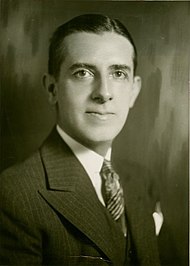
Back پرينتيس كوپير ARZ پرنتیس کوپر AZB Prentice Cooper German Prentice Cooper Portuguese Prentice Cooper Swedish 普伦蒂斯·库珀 Chinese
Prentice Cooper | |
|---|---|
 Cooper circa 1940 | |
| United States Ambassador to Peru | |
| In office July 1, 1946 – June 29, 1948 | |
| President | Harry S. Truman |
| Preceded by | William Pawley |
| Succeeded by | Harold H. Tittmann, Jr. |
| 39th Governor of Tennessee | |
| In office January 16, 1939 – January 16, 1945 | |
| Preceded by | Gordon Browning |
| Succeeded by | Jim Nance McCord |
| Member of the Tennessee Senate from the 18th district | |
| In office 1936–1939 | |
| Preceded by | Leighton Ewell |
| Succeeded by | Lem Motlow |
| Personal details | |
| Born | William Prentice Cooper Jr. September 28, 1895 Bedford County, Tennessee, U.S. |
| Died | May 18, 1969 (aged 73) Rochester, Minnesota, U.S. |
| Resting place | Jenkins Chapel Cemetery, Shelbyville, Tennessee |
| Political party | Democratic |
| Spouse | Hortense Powell (m. 1950)[1] |
| Children | 3, including Jim and John |
| Alma mater | Princeton University (BA) Harvard Law School (LLB) |
| Profession | Attorney |
| Military service | |
| Allegiance | |
| Branch/service | |
| Years of service | 1917–1919 |
| Rank | Second Lieutenant |
| Unit | 307th Field Artillery |
| Battles/wars | World War I |
William Prentice Cooper Jr. (September 28, 1895 – May 18, 1969) was an American politician and diplomat who served as the 39th governor of Tennessee from 1939 to 1945. He led the state's mobilization efforts for World War II, when over 300,000 Tennesseans joined the armed forces, and numerous defense-related facilities were established across the state. He later served as United States Ambassador to Peru (1946–1948) and chaired Tennessee's 1953 constitutional convention.[2]
- ^ Anne-Leslie Owens, "William Prentice Cooper, Jr.," Tennessee Encyclopedia of History and Culture, 2009. Retrieved: December 14, 2012.
- ^ Governor Prentice Cooper Papers (finding aid) Archived July 12, 2013, at the Wayback Machine, Tennessee State Library and Archives, April 2002. Retrieved: December 14, 2012.